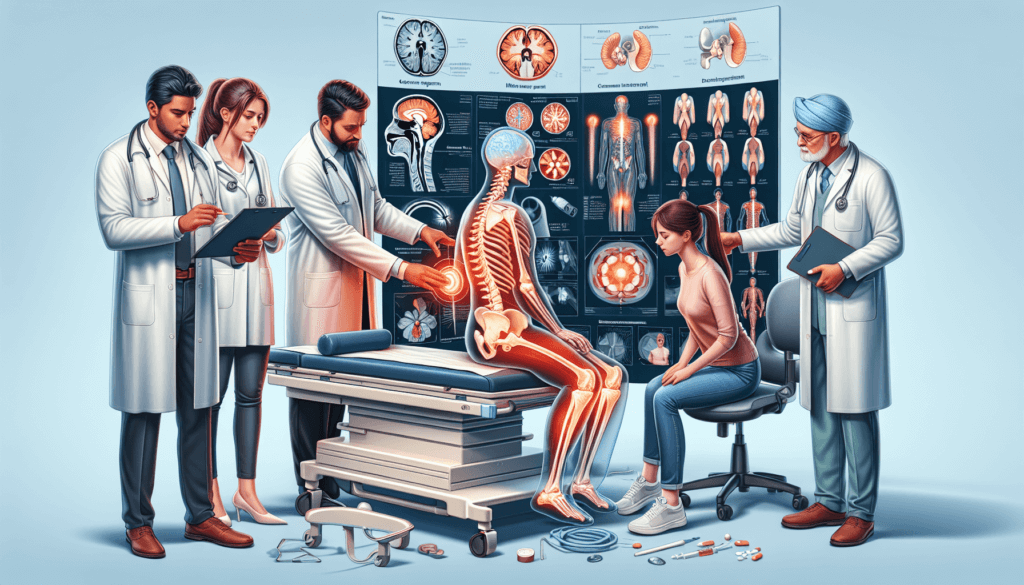Imagine a doctor who specializes in a field solely dedicated to understanding and alleviating pain. This is where a pain management doctor comes in. With their expertise in diagnosing and treating various types of pain, they strive to improve not just your physical well-being, but also your overall quality of life. From chronic back pain to migraines, these compassionate professionals are committed to finding effective solutions tailored to your specific needs. So, if you’ve been grappling with pain that seems insurmountable, it’s time to discover the incredible world of pain management doctors and the incredible relief they can bring to your life.

Definition
Explanation of pain management doctor
A pain management doctor, also known as a pain physician or a pain specialist, is a medical professional who specializes in the diagnosis and treatment of various types of pain. This includes chronic pain, acute pain, cancer-related pain, and post-surgical pain. Pain management doctors have extensive knowledge and expertise in the field of pain medicine, allowing them to provide comprehensive care to patients with complex pain conditions.
Role in healthcare system
Pain management doctors play a crucial role in the healthcare system by addressing the needs of patients suffering from pain. They work collaboratively with other healthcare professionals, such as primary care physicians, surgeons, and physical therapists, to deliver optimal pain management treatments. Their primary goal is to improve the quality of life for individuals experiencing pain while addressing both the physical and emotional aspects of their condition. Additionally, pain management doctors are instrumental in preventing opioid misuse and addiction by utilizing effective and safe alternatives for pain relief.
Education and Training
Medical school
To become a pain management doctor, individuals must first complete their undergraduate education, followed by attending medical school. This typically involves obtaining a Bachelor of Science or a Bachelor of Arts degree, followed by earning a Doctor of Medicine (MD) or a Doctor of Osteopathic Medicine (DO) degree. During medical school, aspiring pain management doctors receive a comprehensive education in various branches of medicine, including anatomy, physiology, pathology, pharmacology, and more.
Residency
After graduating from medical school, individuals interested in pursuing a career in pain management must complete a residency program in their chosen specialty. This typically involves a four-year program in anesthesiology, physical medicine and rehabilitation (PM&R), neurology, orthopedic surgery, or rheumatology. During residency, aspiring pain management doctors undergo rigorous training and gain hands-on experience in diagnosing and treating different pain conditions.
Fellowship
Following residency, aspiring pain management doctors can further specialize in pain medicine by completing a fellowship program focused on pain management. These fellowships typically last one to two years and provide intensive training in pain assessment, diagnosis, treatment planning, interventional procedures, medication management, and other pain management techniques. Fellowships allow pain management doctors to refine their skills and expand their knowledge in this specialized field.
Specialties
Pain management doctors can come from various medical specialties. Here are some examples of specialties that pain management doctors may belong to:
Anesthesiologists
Anesthesiologists are medical doctors who specialize in providing anesthesia and pain management during surgical procedures. They play a critical role in ensuring patients’ comfort and safety before, during, and after surgery. Anesthesiologists who choose to specialize in pain management have a deep understanding of the pharmacological and interventional approaches to pain relief.
Physiatrists
Physiatrists, also known as physical medicine and rehabilitation (PM&R) physicians, focus on maximizing physical functioning and improving quality of life for individuals with disabilities or injuries. They utilize a multidisciplinary approach to manage pain and restore functional abilities through various treatments and therapies.
Neurologists
Neurologists are medical doctors who specialize in diagnosing and treating diseases and disorders of the nervous system. They can also specialize in pain management and possess an in-depth understanding of how the nervous system contributes to pain. Neurologists play a crucial role in diagnosing and managing conditions such as migraines, neuropathic pain, and other types of chronic pain.
Orthopedic surgeons
Orthopedic surgeons specialize in diagnosing and treating musculoskeletal conditions and injuries. They can also focus on pain management, particularly related to the joints, bones, and muscles. Orthopedic surgeons employ a variety of treatments, including surgery and non-surgical options, to alleviate pain and improve overall function.
Rheumatologists
Rheumatologists are specialists in diagnosing and managing diseases that affect the joints, muscles, and bones. They have a deep understanding of inflammatory conditions that can cause chronic pain, such as arthritis and autoimmune diseases. Rheumatologists work closely with pain management doctors to develop comprehensive treatment plans for patients.
Skills and Expertise
Pain management doctors possess a wide range of skills and expertise to effectively manage pain and improve patients’ quality of life. Some of these skills and expertise include:
Pain assessment
Pain management doctors are skilled in conducting thorough evaluations of patients’ pain symptoms. They utilize various pain assessment tools and techniques to understand the nature, severity, and impact of pain on an individual’s life. This helps them tailor treatment plans to meet each patient’s specific needs.
Diagnosis
Pain management doctors are trained to diagnose the underlying causes of pain. Through a combination of detailed medical history discussions, physical examinations, and diagnostic tests, they aim to identify the source of pain accurately. Their diagnostic expertise enables them to create personalized treatment plans for each patient.
Treatment planning
Based on their comprehensive assessment and the patient’s specific condition, pain management doctors develop individualized treatment plans. These plans are tailored to address the underlying causes of pain and may incorporate a combination of pharmacological interventions, interventional procedures, physical therapy, alternative therapies, psychological support, and more.
Interventional procedures
Pain management doctors are skilled in performing a variety of interventional procedures to alleviate pain. These procedures may include nerve blocks, epidural steroid injections, radiofrequency ablation, spinal cord stimulation, and more. By utilizing these targeted interventions, pain management doctors can provide significant pain relief and improve patients’ overall well-being.
Medication management
Pain management doctors are knowledgeable in the safe and effective use of medications for pain management. They understand the different classes of pain medication, their mechanisms of action, and potential side effects. Pain management doctors carefully prescribe and monitor medications to ensure patients receive optimal pain relief while minimizing risks.
Physical therapy
Pain management doctors recognize the importance of physical therapy in managing pain and restoring function. They collaborate with physical therapists to develop tailored exercise programs that address patients’ specific conditions. Physical therapy can help improve strength, flexibility, and overall mobility, leading to reduced pain and improved quality of life.
Alternative therapies
In addition to conventional pain management approaches, pain management doctors may incorporate alternative therapies into their treatment plans. This can include techniques such as acupuncture, chiropractic care, massage therapy, and acupuncture. These therapies can provide additional options for pain relief, particularly for patients seeking non-pharmacological alternatives.
Psychological support
Pain management doctors understand that pain often has psychological and emotional components. They work closely with psychologists and mental health professionals to address these aspects of pain. By providing counseling, cognitive-behavioral therapy, and other psychological interventions, pain management doctors support patients in managing their pain and improving their overall well-being.

Conditions Treated
Pain management doctors are equipped to address a wide range of pain conditions. Some common conditions they treat include:
Chronic pain
Chronic pain refers to pain that persists for an extended period, often lasting for three months or more. Pain management doctors specialize in managing chronic pain conditions, such as fibromyalgia, arthritis, neuropathic pain, and chronic back pain. Through a multidisciplinary approach, they aim to help patients manage and reduce chronic pain, improve functionality, and enhance overall quality of life.
Acute pain
Acute pain is typically short-term and often results from injuries, surgical procedures, or medical conditions. Pain management doctors are skilled in providing immediate relief for acute pain through various interventions and medications. They work closely with patients to address the underlying causes of acute pain, minimize discomfort, and promote healing.
Cancer-related pain
Pain management doctors play a vital role in addressing pain associated with cancer and its treatments. They work alongside oncologists and palliative care teams to alleviate cancer-related pain through a combination of pharmacological approaches, interventional procedures, and supportive therapies. By managing cancer-related pain, pain management doctors aim to enhance patients’ quality of life and overall well-being.
Post-surgical pain
After undergoing surgery, patients may experience post-surgical pain. Pain management doctors understand the complexities of post-operative pain and utilize various interventions to manage pain effectively. They work closely with surgeons to develop comprehensive pain management plans, which may involve pre-operative counseling, pain medication management, and targeted interventional procedures.
Treatments and Procedures
Pain management doctors employ a variety of treatments and procedures to alleviate pain and improve patients’ quality of life. Some common treatments and procedures used by pain management doctors include:
Pharmacological interventions
Pain management doctors may prescribe a range of medications to help alleviate pain. These can include nonsteroidal anti-inflammatory drugs (NSAIDs), opioids, muscle relaxants, and neurology-based medications. The selection of medications is based on the individual patient’s needs, tolerance, and the underlying cause of their pain.
Interventional procedures
Interventional procedures performed by pain management doctors can serve as targeted approaches to pain relief. These may include nerve blocks, joint injections, spinal cord stimulation, radiofrequency ablation, and more. By directly targeting the source of pain, these procedures offer effective and long-lasting pain relief for many patients.
Physical therapy
Physical therapy plays a significant role in pain management and rehabilitation. Pain management doctors collaborate with physical therapists to develop customized exercise programs tailored to each patient’s needs. Physical therapy can help strengthen muscles, improve flexibility, and restore functionality, thereby reducing pain and enhancing overall quality of life.
Alternative therapies
Pain management doctors may incorporate alternative therapies into their treatment plans. These may include acupuncture, chiropractic care, massage therapy, and mindfulness techniques. Alternative therapies offer additional options for pain relief, particularly for patients who prefer non-pharmacological approaches to managing pain.
Psychological interventions
Pain management doctors recognize the importance of addressing the psychological and emotional aspects of pain. They may involve psychologists or mental health professionals in the treatment process to provide counseling, cognitive-behavioral therapy, and other psychological interventions. These interventions help patients develop coping strategies, manage stress, and improve their mental well-being in relation to their pain.
Collaboration with Other Specialists
Pain management doctors understand the importance of a multidisciplinary approach to pain management. They work closely with other specialists, including primary care physicians, surgeons, physical therapists, psychologists, and more, to deliver comprehensive care to patients. This collaboration ensures a comprehensive and holistic treatment plan, addressing all aspects of pain and promoting the best possible outcomes for patients.
Multidisciplinary approach
Pain management doctors adopt a multidisciplinary approach to pain management. They collaborate with specialists from various medical disciplines to develop individualized treatment plans. By incorporating the expertise of multiple specialists, pain management doctors can address the diverse needs of patients and provide comprehensive care that encompasses all aspects of pain.
Coordinating care with primary care physicians and specialists
Pain management doctors work closely with primary care physicians and specialists involved in a patient’s care. They maintain open lines of communication, ensure the coordination of treatment plans, and provide regular updates on patients’ progress. This collaborative approach ensures that patients receive cohesive care, and all healthcare professionals involved are well-informed about the best course of action for pain management.
Patient Assessment and Diagnosis
Pain management doctors employ a thorough and comprehensive approach to assess and diagnose patients’ pain conditions. This includes:
Thorough medical history
Pain management doctors begin the assessment process by obtaining a comprehensive medical history from the patient. This includes information on the duration, location, and characteristics of the pain, as well as any previous and current treatments attempted. Additionally, they consider any underlying medical conditions that may contribute to the pain.
Physical examination
A physical examination is conducted by pain management doctors to assess the patient’s overall physical health and identify any visible signs of pain or underlying conditions. By evaluating factors such as range of motion, reflexes, and specific areas of tenderness, pain management doctors can gather important clues about the source and nature of the pain.
Diagnostic tests
To accurately diagnose the underlying cause of the pain, pain management doctors may order various diagnostic tests. These can include imaging studies, such as X-rays, MRI scans, or CT scans, which can provide detailed information about the structure and condition of joints, muscles, bones, and nerves. Additionally, lab tests, such as blood work or nerve conduction studies, may be used to rule out specific conditions or determine the presence of underlying issues.
Pain assessment scales
Pain management doctors utilize various pain assessment scales to gather subjective information about the patient’s pain experience. These scales can help quantify pain intensity, duration, and impact on daily functioning. By incorporating these scales, pain management doctors can better understand the patient’s pain perception and tailor treatment plans accordingly.
Treatment Plan
After a thorough assessment and diagnosis, pain management doctors develop individualized treatment plans that target both the underlying causes of pain and the patient’s specific needs. These treatment plans may include:
Individualized approach
Pain management doctors take an individualized approach to treatment, recognizing that each patient’s pain experience is unique. They consider factors such as the patient’s age, medical history, lifestyle, personal preferences, and overall goals of pain management. By tailoring treatment plans to individual patients, pain management doctors can optimize outcomes and ensure the most effective and appropriate care.
Non-pharmacological options
Pain management doctors utilize non-pharmacological options to complement or, in some cases, replace medications. These non-pharmacological approaches may include physical therapy, alternative therapies, psychological interventions, and lifestyle modifications. By incorporating these options, pain management doctors can provide patients with a range of strategies to manage pain and improve overall well-being.
Medication management
When appropriate, pain management doctors may prescribe medications to alleviate pain. They carefully select and monitor the use of medications, taking into consideration the patient’s pain severity, medical history, potential risks, and benefits. Pain management doctors aim to find the most effective medications while minimizing potential side effects or risks associated with long-term medication use.
Procedures and therapies
Pain management doctors may recommend interventional procedures, such as nerve blocks, epidural steroid injections, or radiofrequency ablation, to provide targeted pain relief. Additionally, they may incorporate physical therapy, acupuncture, chiropractic care, massage therapy, or mindfulness techniques into the treatment plan. These procedures and therapies aim to reduce pain, promote healing, and enhance overall physical functioning.
Monitoring and adjustments
Pain management doctors closely monitor patients’ progress throughout the treatment process. They assess the effectiveness of different treatment modalities and adjust the treatment plan as needed. By regularly communicating and monitoring patients’ response to various interventions, pain management doctors can optimize pain relief and improve patients’ quality of life.
Role in Pain Management
Pain management doctors play a vital role in the field of pain management. Their contributions include:
Improving quality of life
The primary goal of pain management doctors is to improve patients’ quality of life. They recognize the physical, emotional, and social impact that pain can have, and aim to alleviate suffering, promote functionality, and enhance overall well-being. By providing comprehensive care that addresses the multiple dimensions of pain, pain management doctors enable patients to reclaim their lives and engage in activities they enjoy.
Addressing physical and emotional aspects of pain
Pain is a complex experience that involves both physical and emotional aspects. Pain management doctors acknowledge and address these intertwined components. They collaborate with mental health professionals to provide psychological support, implement cognitive-behavioral therapy, and offer counseling to help patients cope with the emotional challenges often associated with chronic pain.
Preventing opioid misuse and addiction
Pain management doctors play a critical role in addressing the ongoing opioid crisis. They prioritize the use of safe and effective alternatives to opioids for pain management whenever possible. By employing a combination of non-pharmacological techniques, interventional procedures, and targeted medications, pain management doctors help mitigate the risks of opioid misuse and addiction while still providing adequate pain relief.
Promoting functional restoration
Pain management doctors aim to improve not only pain symptoms but also patients’ ability to function in their daily lives. By implementing various treatments, physical therapy, and rehabilitation programs, pain management doctors support patients in regaining their physical strength, mobility, and independence. This focus on functional restoration enables patients to resume their daily activities and hobbies with reduced pain and improved overall well-being.
Providing comprehensive care
Pain management doctors offer comprehensive care that extends beyond pain relief alone. They address the individual needs and concerns of each patient, taking into account the broader impact of pain on their lives. By providing a holistic approach to pain management, pain management doctors ensure that patients receive the support and resources necessary to navigate their pain journey successfully.
In conclusion, pain management doctors are specialized medical professionals who are dedicated to improving the lives of individuals suffering from pain. Through their extensive education and training, pain management doctors possess the knowledge and skills necessary to assess, diagnose, and treat various types of pain. They employ a comprehensive and multidisciplinary approach to care, collaborating with other specialists to develop individualized treatment plans. By addressing both the physical and emotional aspects of pain, pain management doctors aim to enhance patients’ quality of life, promote functional restoration, and prevent opioid misuse. With their expertise and compassion, pain management doctors provide comprehensive and personalized care to help individuals find relief from pain and regain control of their lives.


